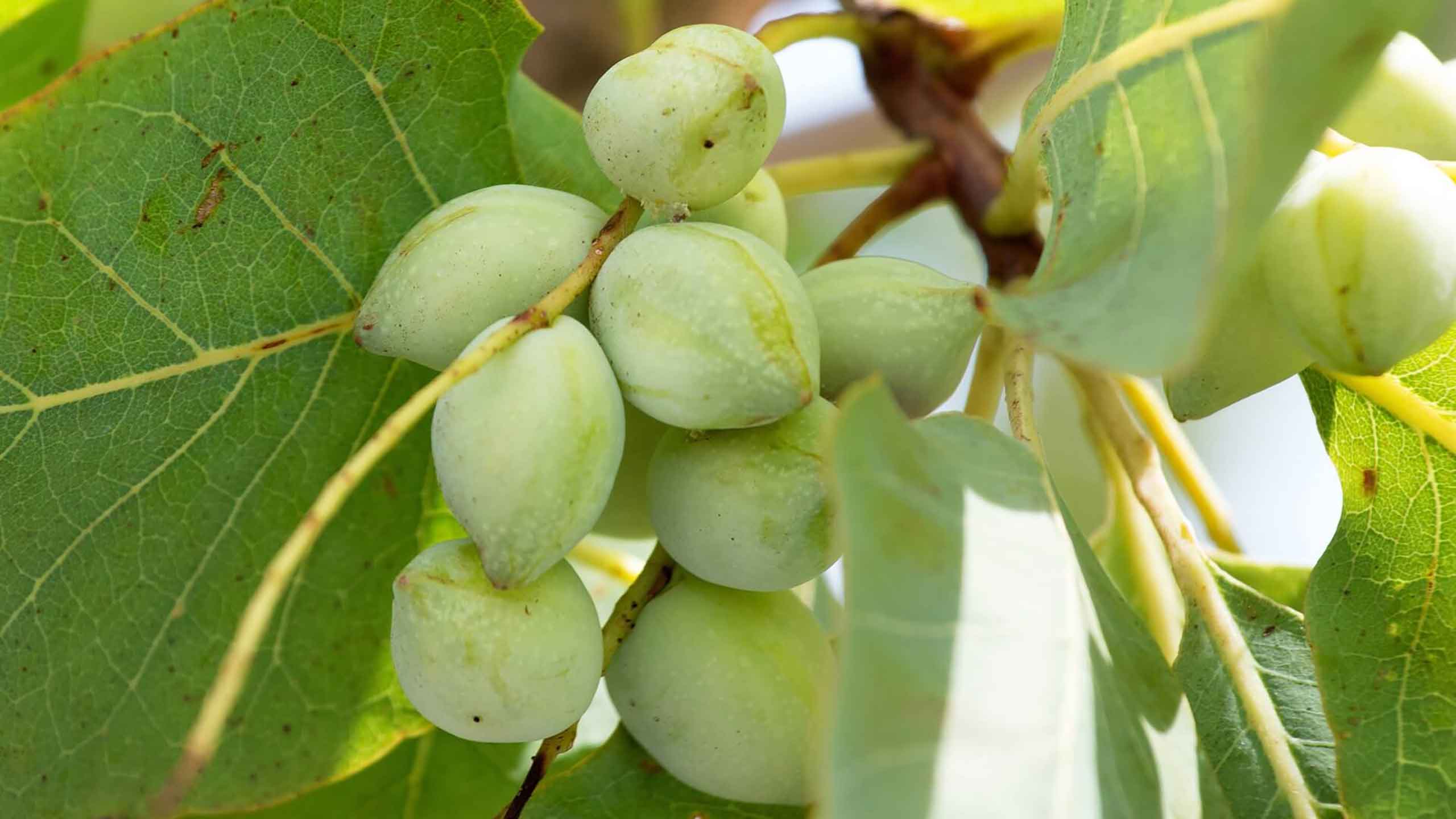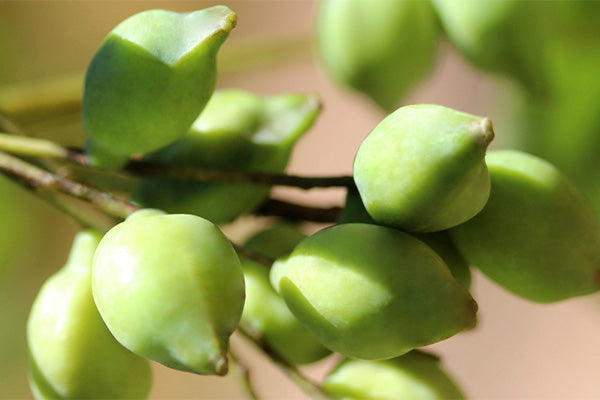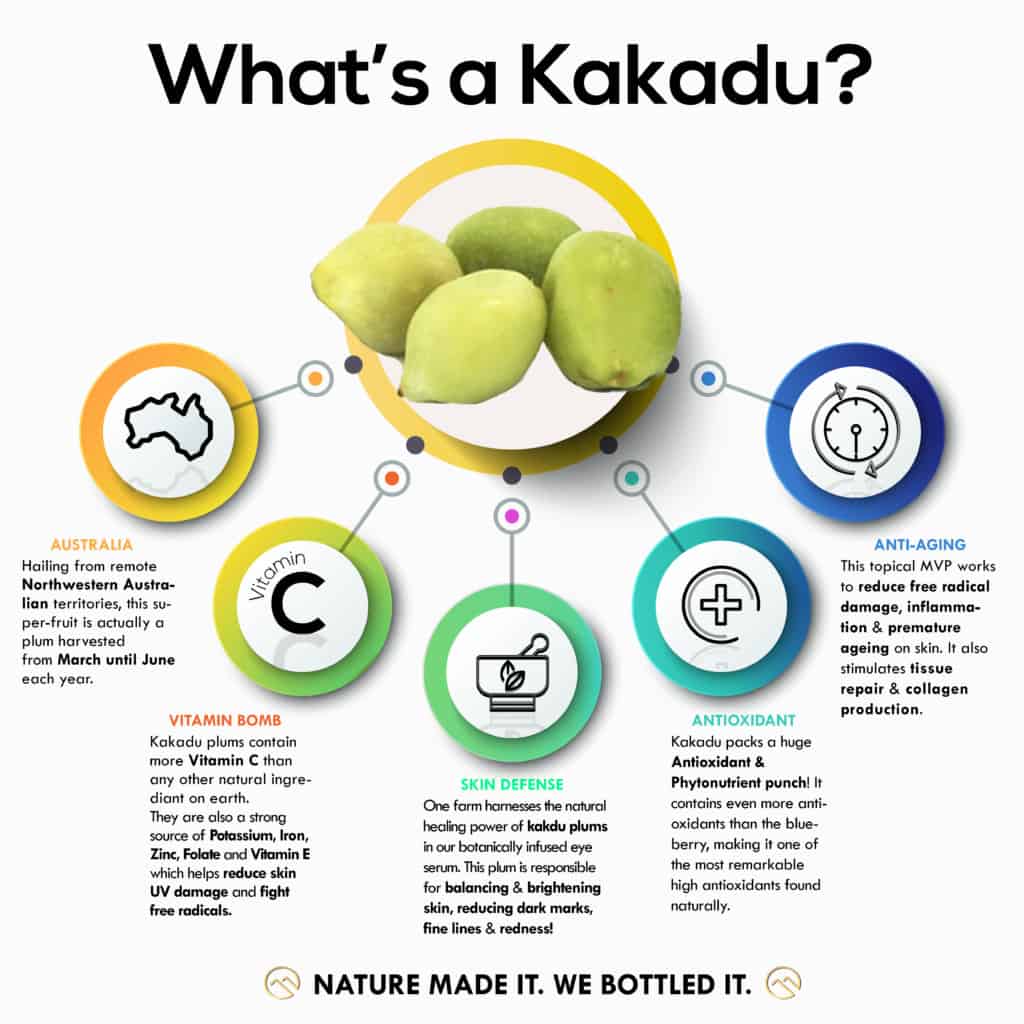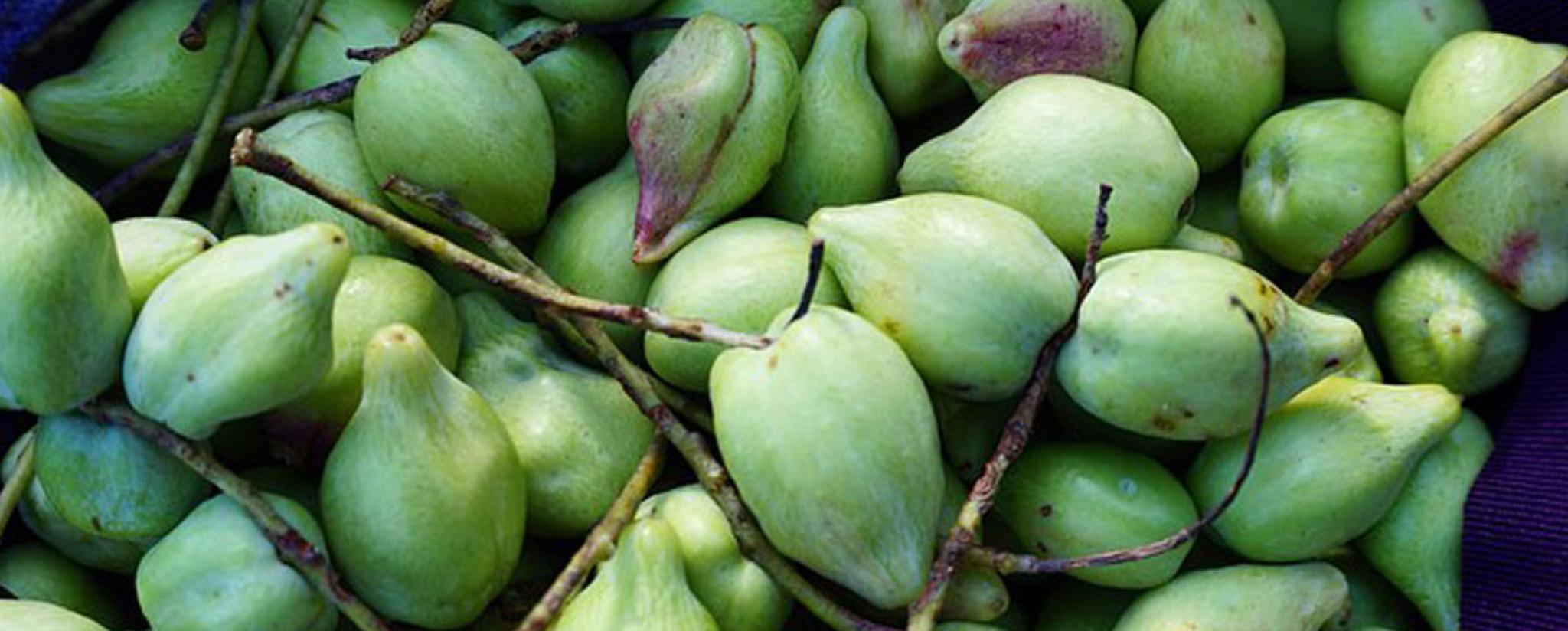
The Kakadu plum
The Kakadu plum (Terminalia ferdinandiana), also known as gubinge or billygoat plum, is a small fruit found in the Eucalypt open woodlands across Northern Australia.
It’s pale green with a stone in the center, over half an inch (1.5–2 cm) long, and weighs 0.1–0.2 ounces (2–5 grams). It’s fibrous and has a tart, bitter taste.
In traditional medicine, Kakadu plums were used to treat colds, the flu, and headaches. They were also utilized as an antiseptic or soothing balm for the limbs.
More recently, they have been recognized for their high nutritional value.
Here are health benefits of Kakadu plums.
Kakadu plums are low in calories and rich in nutrients, providing a quality source of fiber, vitamins, and minerals.
Here is the nutritional breakdown of 3.5 ounces (100 grams) of the edible part of the fruit :
- Calories: 59
- Protein: 0.8 grams
- Carbs: 17.2 grams
- Dietary fiber: 7.1 grams
- Fat: 0.5 grams
- Sodium: 13 mg
- Vitamin C: 3,230% of the Daily Value (DV)
- Copper: 100% of the DV
- Iron: 13.3% of the DV
It’s especially high in vitamin C, a potent antioxidant that protects your body from damage caused by reactive molecules known as free radicals .
Additionally, it’s an excellent source of copper, which is used to form red blood cells, bones, connective tissue, and important enzymes, as well as support proper immune system function and fetal development .
Kakadu plums are also rich in iron, which is essential for oxygen transport throughout your body and red blood cell production .
In addition, they’re a good source of dietary fiber, which protects against constipation, colon cancer, and irritable bowel syndrome (IBS) and promotes gut health and blood sugar control
Finally, Kakadu plums provide smaller amounts of thiamine, riboflavin, magnesium, zinc, and calcium, all of which are essential micronutrients for good health.
Kakadu plums have the highest recorded natural amount of vitamin C of any food in the world. In fact, 3.5 ounces (100 grams) of the fruit provide well over 3,000% of your daily needs (1).
For reference, the same serving of oranges contains 59.1% of the DV, while the same amount of blueberries provides just 10.8% of the DV
Vitamin C is a powerful antioxidant that boosts the immune system, reduces oxidative stress, and may play a role in collagen synthesis, iron absorption, heart health, memory, and cognition .
For example, in adults with high blood pressure, a 500-mg dose of vitamin C reduced systolic blood pressure (the top number) by 4.85 mm Hg and diastolic blood pressure (the bottom number) by 1.67 mm Hg .
Additionally, an analysis of 15 studies noted that people with diets high in vitamin C had a 16% lower risk of heart disease than people with low vitamin C intake .
Eating foods high in vitamin C can also aid the absorption of plant sources of iron.
In fact, adding 100 mg of vitamin C to a meal can improve iron absorption by 67%. This may be particularly useful for vegetarians, vegans, and people with iron deficiency.
The vitamin C content of Kakadu plums drops rapidly after picking, so the fruits are usually frozen for transport and sale .
Furthermore, the vitamin C content of these fruits is likewise reduced when they are cooked. One experiment discovered that a Kakadu plum sauce provided 16.9% less vitamin C than the raw fruits .
Nevertheless, Kakadu plums remain an excellent source of vitamin C — fresh or cooked.

Kakadu plums are rich in a type of organic acid known as ellagic acid.
Ellagic acid is a polyphenol known for being a strong antioxidant. It’s also commonly found in strawberries, boysenberries, walnuts, and almonds.
It has been linked to numerous health benefits, including anticancer, anti-inflammatory, antimicrobial, and prebiotic effects.
For example, test-tube and animal studies have shown that ellagic acid can block tumor growth and cause tumor cell death in a variety of cancers .
However, more research in humans is needed to understand the health effects of dietary ellagic acid.
Currently, there are no recommendations regarding daily ellagic acid intake. Some reports estimate the average daily intake to be approximately 4.9–12 mg .
Kakadu plums contain roughly 228–14,020 mg of ellagic acid per 3.5 ounces (100 grams) of dried fruit. The exact amount is determined by the tree, climate, soil conditions, ripeness, and storage conditions .

Kakadu plums are an excellent source of antioxidants. They contain 6 times the amount of polyphenols and 13.3 times more antioxidant activity than blueberries .
Antioxidants help neutralize unstable molecules called free radicals. Excess numbers of these molecules can harm your body and cause oxidative stress .
Free radicals develop naturally, but poor diet, as well as environmental toxins like air pollution and cigarette smoke, can increase their numbers .
Additionally, research has found that free radicals are linked to health problems like cancer, brain degeneration, diabetes, autoimmune conditions, and heart and kidney disease .
Antioxidants can bind to excess free radicals, protecting your cells against their toxic effects .
Aside from vitamin C and ellagic acid, plums contain many other antioxidants, including :
- Flavonols. These are linked to heart health and may have stroke-reducing, cancer-fighting, and antiviral effects. The main types in Kakadu plums are kaempferol and quercetin .
- Aromatic acids. In Kakadu plums, the main types are ellagic and gallic acid. Gallic acid is associated with neurodegenerative disease prevention .
- Anthocyanins. They are the colored pigments in fruit and associated with good urinary tract health, a lower risk of some cancers, healthy aging, and improved memory and eye health .
- Lutein. This antioxidant is a carotenoid that is linked to eye health and may protect against macular degeneration and heart disease .
The high antioxidant content and activity of Kakadu plums means they may help prevent and fight disease. Still, more research is needed to determine the effects of the fruit itself.
Kakadu plums have also been linked to several other health benefits, including anticancer, anti-inflammatory, and antibacterial properties.

May have cancer-fighting properties
The nutrients in Kakadu plum may help prevent and fight cancer.
Test-tube studies have indicated that extracts from the fruit have anti-inflammatory properties that may help prevent some types of cancer (27Trusted Source, 33Trusted Source).
These extracts also promote cancer cell death in test-tube studies, which is an important immune defense against cancer and cell mutations (33Trusted Source, 34Trusted Source).
Additionally, the fruits are high in ellagic and gallic acids, which have been shown to be toxic to cancer cells in test-tube studies (27Trusted Source).
May protect against inflammatory diseases
Kakadu plums may help protect against inflammatory diseases, such as rheumatoid arthritis.
Rheumatoid arthritis can be triggered by certain infections. Test-tube studies indicate that Kakadu fruit and leaf extract inhibited the bacteria that cause these infections.
This effect is likely due to this fruit’s high tannin content, which comes from ellagitannins — a form of ellagic acid .
Though this research is promising, more evidence is needed.
May offer natural antibacterial properties
Kakadu plums have natural antibacterial properties that could make them useful for preserving foods and preventing foodborne illnesses.
Research has shown that their extracts, seeds, bark, and leaves inhibit the growth of common food pathogens, such as Listeria monocytogenes .
Therefore, food preservation solutions using Kakadu plum extract may be a natural and safe alternative to synthetic methods.
In addition, the antibacterial, antioxidant, and anti-inflammatory properties of the fruit have led to its use in some skin care and acne-fighting products.
However, there is little scientific evidence to support the benefits of the topical application of Kakadu plum extract.
© 2025 Created by Tara.
Powered by
![]()